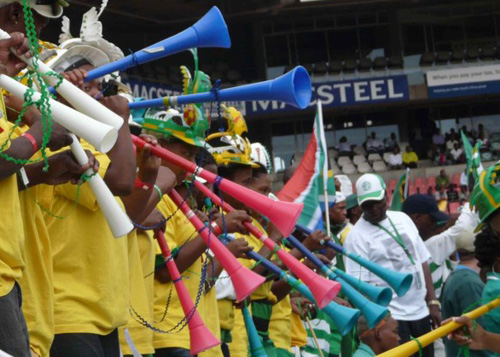Locals who had hoped that the rest of the world would take away some useful knowledge about South Africa’s current affairs could hardly be faulted for cursing the existence of the vuvuzela. Zealous opinion about the ubiquitous plastic horns has nearly dominated the portion of the World Cup’s global media coverage which is reserved for “African content.” Not only that, at the rate they are selling abroad, the trumpets may turn out to be South Africa’s most distinctive export, and its most enduring contribution to football culture. Move over, songmakers of the Spion Kop, the storied Liverpool fan foundry that originated crowd chants! The low B flat drone of the vuvuzela seems destined to turn your rhymes to sonic dust.
Before you are tempted to join the chorus of contempt, consider what we can learn from the debate about the vuvuzela. The most virulent respondents have called for the horn to be banned from stadia (as it is from South Africa’s own elite rugby citadel Newlands). Given the sordid history of banning African drums and other musical forms during colonial and slavery regimes, one might reasonably expect public figures from the global North to think twice before going down a similar road. But this has not restrained a range of commentators–from star players like Spain’s Xabi Alonso to national sports officials like Japan Football Association president Motoaki Inukai–from voicing strong support for a ban. On the other hand, some efforts to defend the horn as a quintessential expression of Africa have been just as condescending. “I have always said that Africa has a different rhythm, a different sound,” tweeted FIFA president Sepp Blatter, inviting the kind of cringe that often greets his offhand public comments.
More consequential was the response from Danny Jordaan, chief exec of South Africa’s World Cup organizing committee, who fought for sixteen years to bring the tournament home. Explaining why he would have rather have had the stadia ringing with crowd chants, he observed: “In the days of the struggle [against apartheid] we were singing, all through our history it’s our ability to sing that inspired and drove the emotions.” Indeed, this is the backdrop to the anti-apartheid struggles that the world remembers, and it is still echoed in the international recognition accorded to distinctive sounds from South Africa such as the a cappella songs of Ladysmith Black Mambazo.
If mellifluent choral phrasing is your standard for representing the nation, the vuvuzela’s monotone is likely to be judged harshly. Indeed, those who have jumped to its defense as an instrument of music-making have run the risk of sounding risible. The horns, it has been argued, have the potential to be played in unison, either in support of a song or in a basic melody of their own, and are often used in call and response routines by coordinated fan groups. But, the argument continues, most of the ones used in the World Cup are being blown by foreigners who have no prior experience with them, and in any case, they are of such poor quality-Made in China-that they cannot be made to perform even by the most skillful practitioners.
For the majority of users, the vuvuzela is, first and foremost, a noisemaker, and in this respect, it resembles the traditional wooden rattle that provided a cacophonous, clacking soundtrack to British soccer matches for several decades after the First World War. This rattle had an indelible working-class association, and, as the game gentrified, was phased out in favor of more articulate crowd expressions. More recently, the thunderstick, of Korean provenance, came to global attention during the 2002 World Cup (hosted by Korea and Japan) and has been widely adopted by fans of American sports and by the corporations who brand the sticks. But the impact of the vuvuzela sound (often compared to an elephant in distress, or a megaswarm of angry bees) has reached much further, pushing fan noise beyond the point even of corporate acceptability. It has threatened to negate the visual slickness of the stadium billboard ads and to ruffle the corporate polish of the global TV operation, built around heroic ad spots which depict stars in Olympian profile, performing exploits that far outmatch what they can ever achieve on the actual field. Thus the BBC worked hard to design a “clean” feed that would strip out most of the crowd noise in its broadcasts.
With the home team’s dismissal from the tournament in the opening group round, some of the rationale for the vuvuzela as the “12th man” of the home side fell away–the Johannesburg Star had promised that the din would “blow our opponents away, and turn other teams to jelly.” But this turn of events has only served to redirect focus on the horn’s impact toward the people whose consumer gratification is all but sacrosanct–the remote TV viewers, far from the vuvu-zeal of the stadium crowd, in the atomistic comfort of their homes.
Put more abstractly, the vuvuzela has become a blank cipher in an arena otherwise arranged for complete legibility–a baffling, and to many disturbing, intrusion on the management of their passions. And who or what is its energy source? The fans at these games are well-heeled enough to afford the pricey match tickets, and many of them hail from other continents, but in the global imagination, the sound of the vuvuzela is indelibly that of the African masses–issuing from the long, historical horn of their neglect, insistent now on being heard, and resigned to the knowledge that not being welcomed or understood may be their best shot at getting attention.
Andrew Ross is Professor of Social and Cultural Analysis at NYU. His
most recent book is Nice Work If You Can Get It: Life and Labor in
Precarious Times.
most recent book is Nice Work If You Can Get It: Life and Labor in
Precarious Times.


